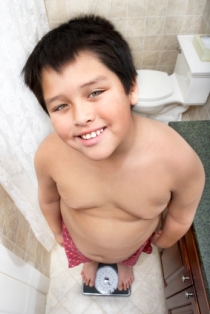Worthless Weigh-ins?
Doctors’ Advice on Weight Loss Does Little to Curb Childhood Obesity
When the average American teen eats fast food fare twice a week, when 92 percent of children don’t have recess year ‘round, and when only 30 percent of kids eat a fruit or vegetable every day, it’s no wonder why 25 million kids are obese. Obesity has never not been an issue among kids, but today, it far surpasses anything we’ve seen in recent memory, and it requires urgent action (the obesity rate among 6 to 11-year-old kids is five times higher today than what it was 40 years ago).
If you have a child with weight problems, then you’re probably familiar with what your pediatrician considers a useful solution: Your son or daughter walks in, gets weighed, then receives a mini-lecture on the dangers of child obesity and what he or she needs to do to combat it…in a kid-friendly way of course. The good doctor then suggests to you, the parent, that weight levels need to be monitored by the school nurse for as long as it takes until the weight comes off.
Constant weigh-ins surely sounds inconvenient, but why fool with what works, right?
That’s just it, though: Turns out they doesn’t work.
According to a study out of Melbourne, Australia and recently published in the British Medical Journal, doctor’s office weigh-ins has little to no effectiveness in weight loss promotion among children.
Researchers discovered this after following approximately 260 kids who were overweight or obese at the time of their weigh-in. Each of them was randomly assigned to one of two groups: One group with frequent weigh-ins and suggestions from their pediatrician (suggestions to their parents as well) and one group where the pediatrician was not involved at all.
After one year, the only difference found was that the counseled crew drank less soda (so not a total loss), but other than that, no statistically significant difference in weight loss.
Hard to believe, but this is the first time a study has been done to see if the doctor’s office weigh-in even works!
Every child is different, and there have no doubt been occasions in which doctor’s office weigh-ins have worked. But what works far more often is a more active role among parents. Parents have a much stronger influence on their kids and their actions. And rightfully so. After all, parents are the ones with their child the majority of the time, and parents are the ones that provide them with their food choices.
As such, it’s important to not buy foods that will make it easy for them to cheat. “Clean house” of all tempting treats, as moments of weakness come regularly at that age (any age, really, but especially when young).
Exercise is the other important quotient in the weight loss formula. But it shouldn’t be demanded. None of this “Go exercise!” or “Go play!” stuff. Far better to exercise with Jack or Sue. Far better to play with Bobby or Jill. Not only does this form a greater parent-to-child bond, but it’s something that the young son or daughter will look forward to doing. And I can guarantee it will be something the son or daughter will look back on fondly as the years go by.
Sources:
msnbc.msn.com
clintonfoundation.org
Related Posts
- Child Obesity Resulting in Risky Stomach Surgery
- “Gene” Made Me Do It: Could ‘FTO’ Gene Be Reason Why We Overeat?
- Dangers of Children’s Cold Medications
- Preschoolers Face Greater Risk of Side Effects from the drug Ritalin…
- Artificial Food Additives Increase Hyperactivity Risk in Children, Study Finds
 
|
Enjoy this article? We guarantee your privacy. Your email address will NEVER be rented, traded or sold. |
Visit my new site: Self Help On The Web
 |
 |
Posted: October 1st, 2009 under Obesity.
Tags: adolescent nutrition, adolescent obesity, adolescent weight control, adolescent weight loss, adolescent weight management, child nutrition, child obesity, child weight loss, child weight management, Childhood Obesity, childhood obesity prevention, children and weight, Children's Health, children's nutrition, children's weight loss, children's weight management, effects of childhood obesity, nutrition for kids, obesity in children, overweight child, overweight children, preventing childhood obesity, weight control, weight management







